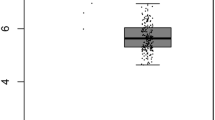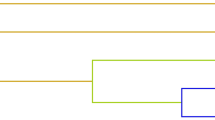Abstract
This study ascertained to explore the potential contribution of ARRDC3 polymorphisms in the risk and prognosis of glioma. One thousand sixty-one patients and healthy controls were conducted to assess whether ARDC3 polymorphism was associated with glioma risk and prognosis. Four sites in ARRDC3 were selected and genotyped in MassARRAY platform. The calculated odd ratios and 95% confidence intervals from logistic regression were applied for risk assessment. The relationship between ARRDC3 variants and glioma prognosis was evaluated using log-rank test, Kaplan–Meier analysis, and so on. Also, false-positive report probability (FPRP) and statistical power were also assessed. Our findings suggested the negative role of ARRDC3 polymorphisms in the glioma risk. We also found the effect of candidate SNPs in ARRDC3 on the susceptibility to glioma was dependent on the age, gender, and histology of glioma patients. The results suggested that the genetic polymorphisms of ARRDC3 were related to an increased risk of glioma.

Similar content being viewed by others
Data availability
The datasets used and analyzed in our current study are available from corresponding author for all reasonable request.
References
Arakaki AKS, Pan WA, Lin H, Trejo J (2018) The α-arrestin ARRDC3 suppresses breast carcinoma invasion by regulating G protein-coupled receptor lysosomal sorting and signaling. J Biol Chem 293:3350–3362
Chen W, Zheng R, Baade PD, Zhang S, Zeng H, Bray F, Jemal A, Yu XQ, He J (2015) Cancer statistics in China. Ca Cancer J Clin 66(2016):115–132
Cherry AE, Stella N (2014) G protein-coupled receptors as oncogenic signals in glioma: emerging therapeutic avenues. Neuroscience 278:222–236
Freije WA, Castro-Vargas FE, Fang Z, Horvath S, Cloughesy T, Liau LM, Mischel PS, Nelson SF (2004) Gene expression profiling of gliomas strongly predicts survival. Can Res 64:6503–6510
Guichet PO, Masliantsev K, Tachon G, Petropoulos C, Godet J, Larrieu D, Milin S, Wager M, Karayan-Tapon L (2018) Fatal correlation between YAP1 expression and glioma aggressiveness: clinical and molecular evidence. J Pathol 246:205–216
Guo X, Song J, Zhao J, Wang B, Yang Z, Sun P, Hu M (2019) Impact of ANXA5 polymorphisms on glioma risk and patient prognosis. J Neurooncol 142:11–26
Jin T, Wang Y, Li G, Du S, Yang H, Geng T, Hou P, Gong Y (2015) Analysis of difference of association between polymorphisms in the XRCC5, RPA3 and RTEL1 genes and glioma, astrocytoma and glioblastoma. Am J Cancer Res 5:2294
Jin TB, Du S, Zhu XK, Li G, Ouyang Y, He N, Zhang Z, Zhang Y, Zhang L, Yuan D (2016) Polymorphism in the IL4R gene and clinical features are associated with glioma prognosis: analyses of case-cohort studies. Medicine 95:e4231
Jiri S (2013) Xu-Gang, Yuan, Dong-Ya, Kang, Long-Li, Jin, Tian-Bo, Association of polymorphisms in FLT3, EGFR, ALOX5, and NEIL3 with;glioblastoma in the Han Chinese population. Med Oncol 30:718
Lin S, Zhang G, Zhao Y, Shi D, Ye Q, Li Y, Wang S (2020) Methylation and serum response factor mediated in the regulation of gene ARRDC3 in breast cancer. Am J Transl Res 12:1913–1927
Liu YG, Teng YS, Shan ZG, Cheng P, Hao CJ, Lv YP, Mao FY, Yang SM, Chen W, Zhao YL, You N, Zou QM, Zhuang Y (2020) Arrestin domain containing 3 promotes Helicobacter pylori-associated gastritis by regulating protease-activated receptor 1. JCI Insight 5:e135849
Ogawa M, Kanda T, Higuchi T, Takahashi H, Kaneko T, Matsumoto N, Nirei K, Yamagami H, Matsuoka S, Kuroda K, Moriyama M (2019) Possible association of arrestin domain-containing protein 3 and progression of non-alcoholic fatty liver disease. Int J Med Sci 16:909–921
Ostrom QT, Gittleman H, Stetson L, Virk SM, Barnholtz-Sloan JS (2015) Epidemiology of gliomas. Cancer Treat Res 163:1–14
Qi S, O’Hayre M, Gutkind JS, Hurley JH (2014) Structural and biochemical basis for ubiquitin ligase recruitment by arrestin-related domain-containing protein-3 (ARRDC3). J Biol Chem 289:4743–4752
Rafiq S, Khan S, Tapper W, Collins A, Upstill-Goddard R, Gerty S, Blomqvist C, Aittomäki K, Couch FJ, Liu J, Nevanlinna H, Eccles D (2014) A genome wide meta-analysis study for identification of common variation associated with breast cancer prognosis. PLoS One 9:e101488
Sang W, Xue J, Su LP, Gulinar A, Wang Q, Zhai YY, Hu YR, Gao HX, Li X, Li QX, Zhang W (2020) Expression of YAP1 and pSTAT3-S727 and their prognostic value in glioma. J Clin Pathol 8:513–521
Schwartzbaum JA, Fisher JL, Aldape KD, Wrensch M (2006) Epidemiology and molecular pathology of glioma. Nat Rev Neurol 2:494
Shen X, Sun X, Sun B, Li T, Wu G, Li Y, Chen L, Liu Q, Cui M, Zhou Z (2018) ARRDC3 suppresses colorectal cancer progression through destabilizing the oncoprotein YAP. FEBS Lett 592:599–609
Susan Amirian E, Marquez-Do D, Bondy ML, Scheurer ME (2013) Anti-human-cytomegalovirus immunoglobulin G levels in glioma risk and prognosis. Cancer medicine 2:57–62
Takeuchi F, Kukimoto I, Li Z, Li S, Li N, Hu Z, Takahashi A, Inoue S, Yokoi S, Chen J, Hang D, Kuroda M, Matsuda F, Mizuno M, Mori S, Wu P, Tanaka N, Matsuo K, Kamatani Y, Kubo M, Ma D, Shi Y (2019) Genome-wide association study of cervical cancer suggests a role for ARRDC3 gene in human papillomavirus infection. Hum Mol Genet 28:341–348
Tian X, Irannejad R, Bowman SL, Du Y, Puthenveedu MA, von Zastrow M, Benovic JL (2016) The α-arrestin ARRDC3 regulates the endosomal residence time and intracellular signaling of the β2-adrenergic receptor. J Biol Chem 291:14510–14525
Wang L, Zhu B, Wang S, Wu Y, Zhan W, Xie S, Shi H, Yu R (2017) Regulation of glioma migration and invasion via modification of Rap2a activity by the ubiquitin ligase Nedd4-1. Oncol Rep 37:2565–2574
Xiao J, Shi Q, Li W, Mu X, Peng J, Li M, Chen M, Huang H, Wang C, Gao K, Fan J (2018) ARRDC1 and ARRDC3 act as tumor suppressors in renal cell carcinoma by facilitating YAP1 degradation. Am J Cancer Res 8:132–143
Zhang H, Nie W, Zhang X, Zhang G, Li Z, Wu H, Shi Q, Chen Y, Ding Z, Zhou X, Yu R (2013) NEDD4–1 regulates migration and invasion of glioma cells through CNrasGEF ubiquitination in vitro. PLoS One 8:e82789
Zhang J, Yang J, Chen Y, Mao Q, Li S, Xiong W, Lin Y, Chen J, Ge J (2016) Genetic variants of VEGF (rs201963 and rs3025039) and KDR (rs7667298, rs2305948, and rs1870377) are associated with glioma risk in a Han Chinese population: a case-control study. Mol Neurobiol 53:2610–2618
Zheng Y, Lin ZY, Xie JJ, Jiang FN, Chen CJ, Li JX, Zhou X, Zhong WD (2017) ARRDC3 Inhibits the Progression of Human Prostate Cancer Through ARRDC3-ITGβ4 Pathway. Curr Mol Med 17:221–229
Author information
Authors and Affiliations
Contributions
SG and YS designed the project and took part in revising the manuscript. PH, LG, and YS performed sample collection. NL and HS completed the experiments, writing and revising the manuscript. WD, LW, and TJ performed data management. WM, GZ, and NW took part in data analysis. SG supervised the project.
Corresponding author
Ethics declarations
Ethics approval
All participants have signed informed consent, and our study was approved by the Ethics committee of the First Affiliated Hospital of Xi’an Jiaotong University and the 1964 Helsinki declaration.
Consent to participate
The study was agreed by all the subjects.
Consent for publication
All the authors agreed to publish the manuscript.
Conflict of interest
The authors declare no competing interests.
Additional information
Publisher's note
Springer Nature remains neutral with regard to jurisdictional claims in published maps and institutional affiliations.
Nan Li and Hangyu Shi are co-first authors.
Supplementary Information
Below is the link to the electronic supplementary material.
Rights and permissions
About this article
Cite this article
Li, N., Shi, H., Hou, P. et al. ARRDC3 polymorphisms may affect the risk of glioma in Chinese Han. Funct Integr Genomics 22, 27–33 (2022). https://doi.org/10.1007/s10142-021-00807-7
Received:
Revised:
Accepted:
Published:
Issue Date:
DOI: https://doi.org/10.1007/s10142-021-00807-7




